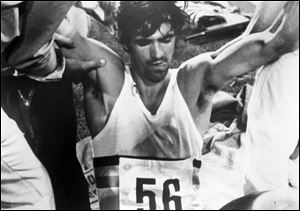
DVD REVIEWS
Munich Olympics, 1972 murders caught in ‘Visions of 8’
8/2/2012
Claude Lelouch’s defeat in the segment ‘The Losers’ f rom the 1973 Olympics film ‘Visions of 8.’"
The most famous Olympics documentaries are Leni Riefenstahl's Olympia, about the 1936 Berlin Olympics, and Kon Ichikawa's 1965 Tokyo Olympiad, which is as almost as great as Olympia and has the added benefit of being Hitler-free.
A third Olympics documentary, Visions of 8, while not nearly as well known, has its own marvels. It's available on DVD from Olive Films and very much worth checking out as we immerse ourselves in the Summer Olympics.
Producer David Wolper had the high concept of showcasing the work of eight (originally 10) international filmmakers covering the 1972 Munich Olympics in stand-alone, 10-minute segments. The directors, most of whom had little experience in documentaries, chose their own crews and filmed the events as they saw fit.
Inevitably, as these mini-films play off each other, the movie itself becomes something of an Olympic event. Who will get the medals for best movie-making?
DVD SNIPPETS: The Rolling Stones -- Live at the Checkerboard Lounge Chicago, 1981
The most famous filmmakers in the bunch are Mai Zetterling (The Strongest, about weightlifters); Arthur Penn (The Highest, pole vaulters); Ichikawa (The Fastest, men's 100 meter dash); Claude Lelouch (The Losers); Milos Forman (The Decathlon), and John Schlesinger (The Longest, marathoners).
Schlesinger's is the only segment that fully acknowledges the "Black September" terrorist attacks, in which 11 Israeli athletes and coaches, and a West German policeman, were murdered. In almost none of the segments are the individual athletes identified.
The West German director Michael Pfleghar shows a remarkable eye for athletic grace in The Women, which features the supernally limber Soviet gymnast Ludmilla Tourischeva. He shows us her entire routine on the uneven parallel bars and you sit there dumbstruck at how supple a body can be.
Unlike a lot of sports filmmakers, Pfleghar understands that often the best way to capture poetry in motion is to simply let the motion play out its poetry unimpeded by a lot of fancy camerawork and zooms and slo-mo.
Having said that, there are two segments in Visions of 8, Penn's and Ichikawa's, in which the action is severely, and optimally, slowed down.
Penn's entry begins daringly. Not only is the imagery a slo-mo crawl, it's also out of focus and the soundtrack is silent. Gradually the visuals sharpen, the stadium sounds come up, but, for the most part, the pole vaulters rising into the sky remain superslow abstractions.
Along with his great editor Dede Allen, who cut Bonnie and Clyde, Penn anatomizes the action without ever losing sight of the fact that these athletes, including USA's Bob Seagren, are men and not gods (as Riefenstahl might have us believe).
Ichikawa films the 100-meter dash, which takes about 10 seconds in real time, in excruciatingly slow motion, so that it lasts about six minutes. We see the runner's faces mashed into gargoyle contortions by the flattening force of the air. Using multiple high-speed cameras, Ichikawa conveys the full agony of the event.
One of the annoyances of Olympics coverage on TV is that so much attention is given to the medalists and hardly any to the athletes left out of the winners' circle.
Lelouch's The Losers, by welcome contrast, shows us a boxer who rants in the ring after his defeat; wrestlers gamely trying to fight after tearing ligaments and dislocating limbs; swimmers treading befuddled in the pool after their last losing lap. (Needless to say, Mark Spitz does not figure greatly in this segment.)
Zetterling's weight lifters, all muscle all the time, are in some cases humbled by the bar, one of which takes five men to carry off the stage.
My favorite moment comes at the end, in Schlesinger's segment. After the events have all but wrapped up and closing speeches delivered, a lone marathoner, many miles and hours behind the pack, sprints into the darkened stadium, his head held high.